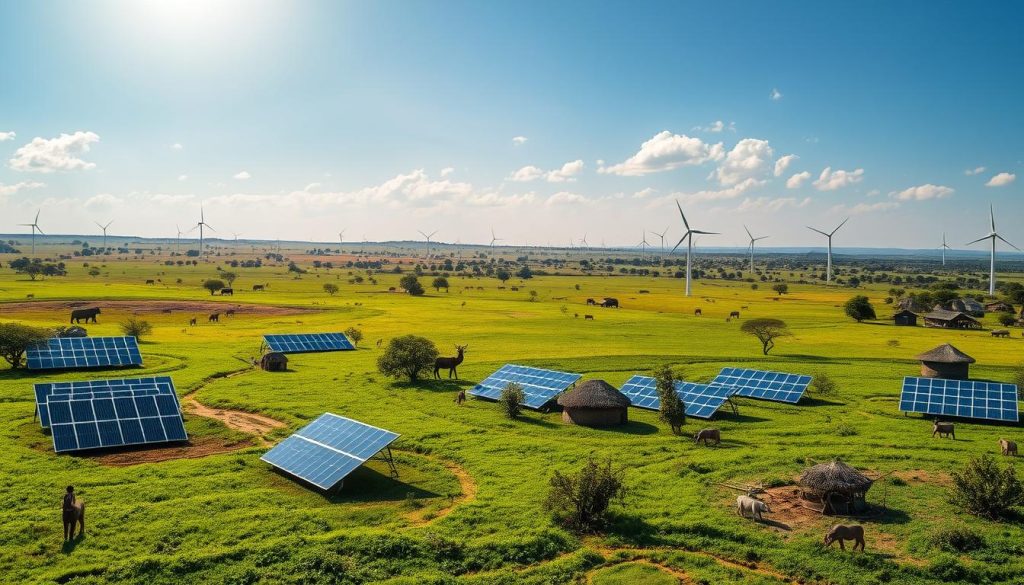Africa is on the verge of a big change in energy. It has lots of renewable energy like solar, wind, and more. This article looks at how these resources are leading to green business ideas. These ideas help the economy grow and fight climate change.
Understanding the Importance of Renewable Energy in Africa
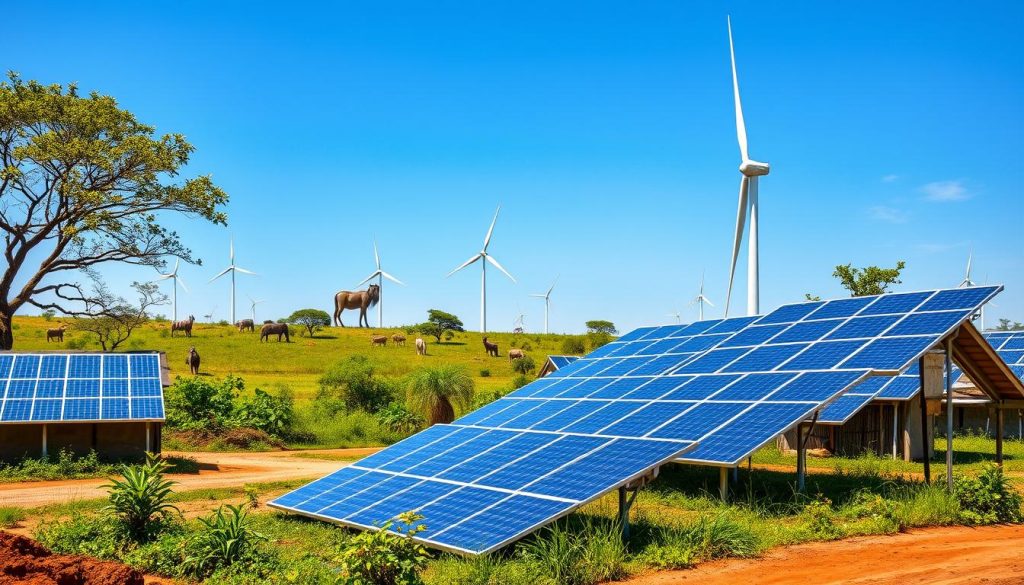
Africa has a big energy problem, with over 600 million people without electricity. Renewable energy is key to solving this issue. It helps meet Africa’s energy needs and supports sustainable development goals.
Switching to renewable energy boosts energy security. It also cuts down on fossil fuel use, a big problem in Africa. This change is crucial for the continent’s future.
Renewables are essential for tackling environmental issues. Deforestation and air pollution are major problems. Solar, wind, and hydroelectric power can help solve these issues and improve the environment.
Investing in renewable energy also boosts the economy. It creates many jobs in the growing green economy. This is a win-win for both the environment and the economy.
Key Benefits of Renewable Energy Ventures
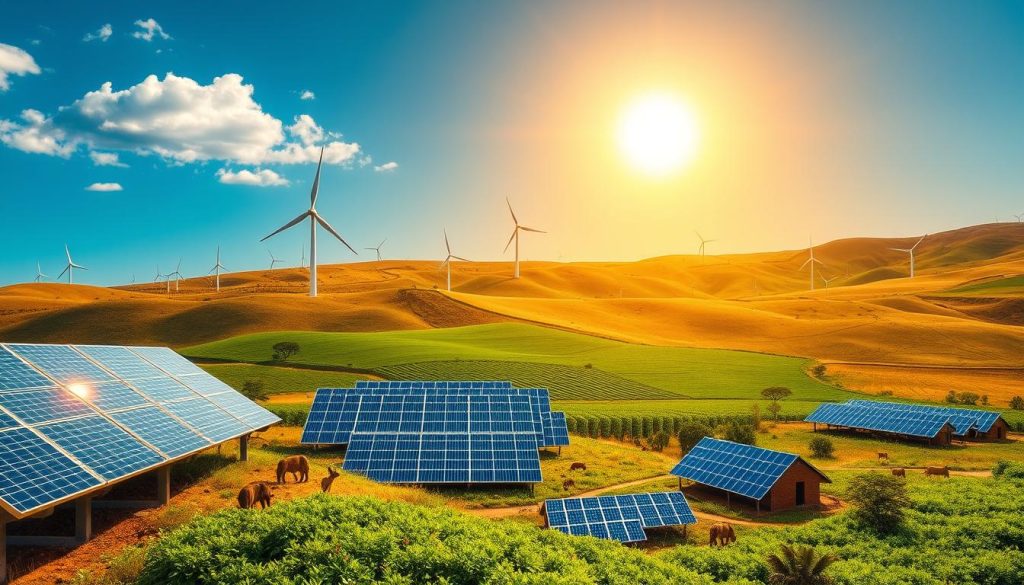
Renewable energy ventures offer many advantages, especially for sustainable economic plans. They help the environment and boost economic growth. They also create jobs in areas like installation, maintenance, and manufacturing.
Economic Growth and Job Creation
Renewable energy is key for economic growth. The International Renewable Energy Agency (IRENA) says the global renewable sector had about 12 million jobs in 2020. This shows Africa could see similar growth with new initiatives.
Renewables not only give clean energy but also create jobs. This helps local economies grow.
Environmental Sustainability
Renewable energy is also vital for the environment. It helps cut down greenhouse gas emissions, which fights climate change. Many countries have used renewable energy to reduce their carbon footprint.
This shows their commitment to global climate goals. As they move away from finite resources, they set a good example. They show how green technologies can lead to a sustainable future.
Renewable Energy Business Ideas in Africa
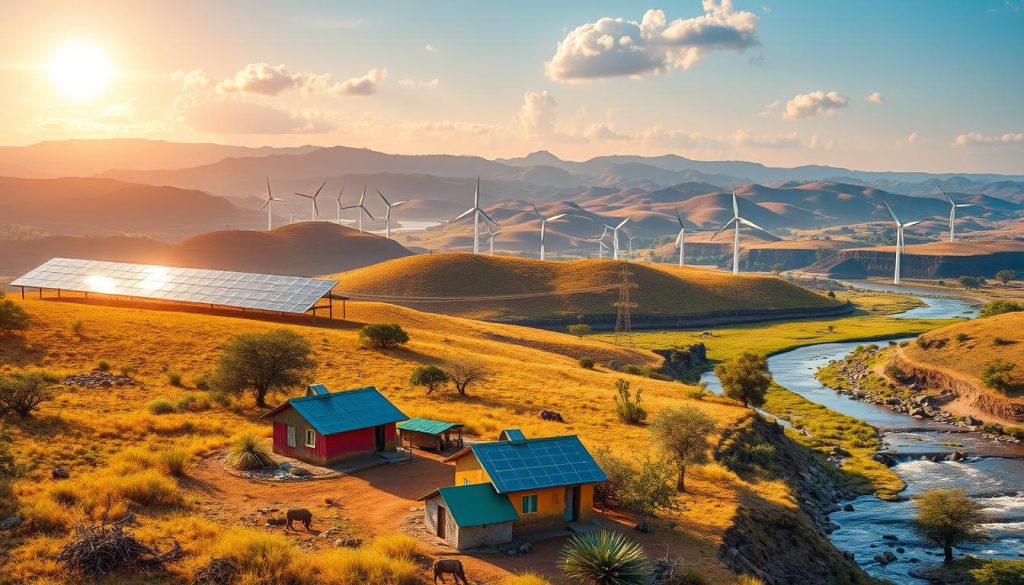
Africa is full of chances for those who love renewable energy. The different climates and lots of natural resources make it great for green businesses. This attracts both investors and innovators.
There are many promising areas for renewable energy business ideas:
- Solar Energy: Africa’s bright sun makes solar power a top choice. Entrepreneurs can set up solar panels and off-grid systems for villages.
- Wind Energy: Some parts of Africa have strong winds. Wind farms and small turbines can meet local energy needs and boost the economy.
- Hydropower: Africa has plenty of water for hydropower. Small and big systems can provide clean energy in towns and villages.
- Biomass Energy: Turning farm waste into energy is good for the planet and helps manage waste. It’s a key part of Africa’s green goals.
- Geothermal Energy: Places with geothermal activity can generate power and use it directly. This helps Africa become more energy independent and green.
Companies in these fields help local communities and the planet. Starting a renewable energy business is a smart move. It can lead to big changes and make money in Africa.
Solar Energy Initiatives and Opportunities
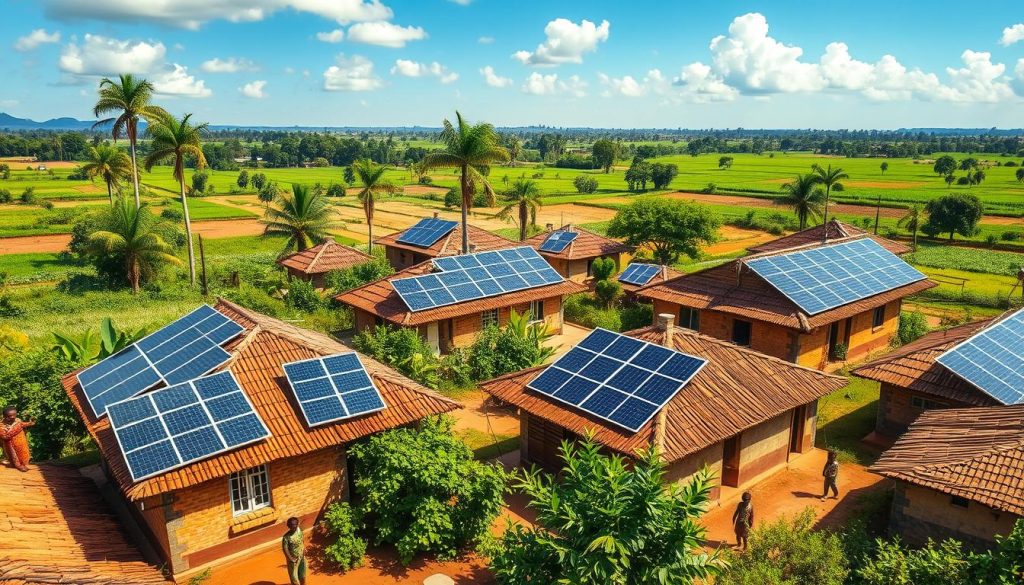
Solar energy is becoming a top choice for many African countries. The area gets a lot of sunlight, making it perfect for solar panels. This has opened up new chances for businesses.
Thanks to cheaper solar tech, companies can now offer installation and upkeep services. This is great news for those looking to make money in this field.
Solar Panel Installation and Maintenance
More people are choosing solar panels because they save money and help the planet. Companies can make a lot by installing and keeping these panels running well. The benefits include:
- Lower energy bills for homes and businesses.
- More independence from the grid by using local sunlight.
- Less harm to the environment by using less fossil fuels.
Those who focus on putting in and fixing solar panels can do well. The market for solar energy is growing fast, and it’s a chance to make a difference.
Off-Grid Solar Solutions for Rural Communities
Rural areas in Africa often don’t have access to electricity. But, off-grid solar systems can change that. They bring power for homes, businesses, and learning.
These systems are key for growth in rural areas. They help people live better lives and support local businesses. Good examples include:
- Pay-as-you-go systems that make energy affordable.
- Models where communities own and manage their energy.
- Working with NGOs to help those who need it most.
These projects show how solar energy can really change lives. They make a big difference in places that need it most.
Wind Energy Potential in African Regions
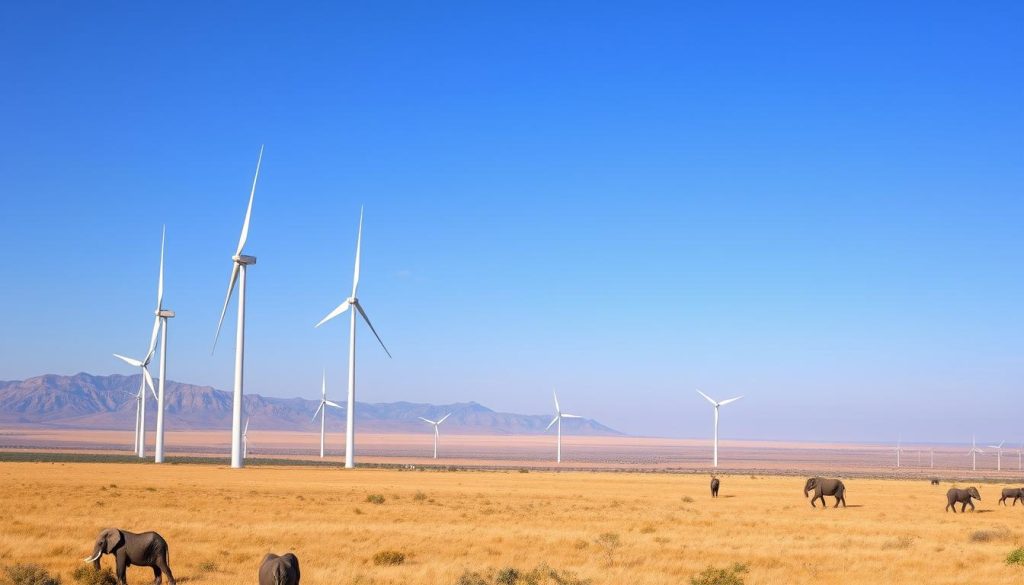
African countries are seeing the big potential of wind energy. It’s a clean way to meet their energy needs. South Africa and Kenya are leading the way with their wind farms.
Before starting these projects, it’s important to do thorough checks. This makes sure they are done in a way that’s good for the planet.
Wind Farm Development
Setting up wind farms needs careful planning. Here are the key steps:
- First, we check the wind patterns and how much energy we can get.
- Then, we talk to local people to share the good news and listen to their worries.
- We also do studies to see how the wind farms might affect the environment.
- Finally, we find the money needed, often with help from grants or investors.
These steps are vital for making wind energy projects work well. They help the economy and protect our planet.
Small Wind Turbine Solutions for Localised Energy
Small wind turbines are great for local energy needs. They can be set up in places far from cities. This helps people use less of the old energy types.
- They can make energy costs lower for homes and businesses.
- They let local areas make their own power.
- They help Africa use more clean energy.
Supporting these projects helps us use energy in a way that’s good for the future. It makes Africa more energy independent.
Hydropower Projects across Africa
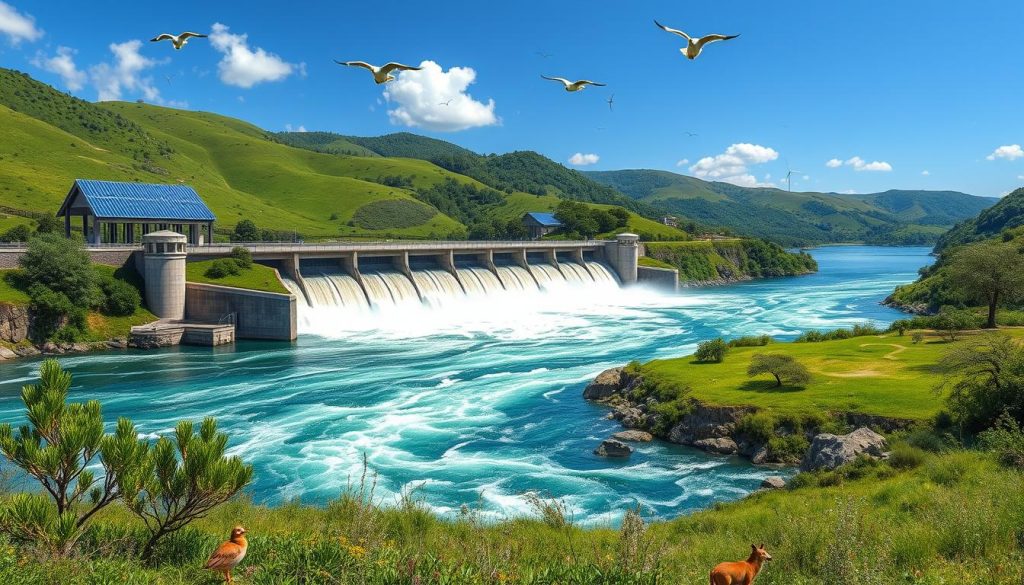
Hydropower projects are a big chance for Africa to get sustainable energy. The continent has lots of water, perfect for making energy with small-scale hydropower. These projects give clean energy, help the local economy, and protect the environment.
Small-scale Hydropower Systems
Small-scale hydropower is becoming more popular in remote and rural areas. It lets communities make their own electricity, cutting down on fossil fuel use. These systems have little impact on nature, keeping ecosystems safe.
Benefits of small-scale hydropower systems include:
- They are cheaper than big projects
- They can create jobs in installation and upkeep
- They make energy more secure for rural areas
Community-based Hydropower Initiatives
Community-based projects are key to starting hydropower projects. When locals are involved, the systems meet their needs better. These projects empower communities, making them take pride in sustainable practices.
Successful community-based hydropower projects show how working together can change energy landscapes. They also show how to make energy production financially stable, good for people and the planet.
Biomass Energy as a Sustainable Resource
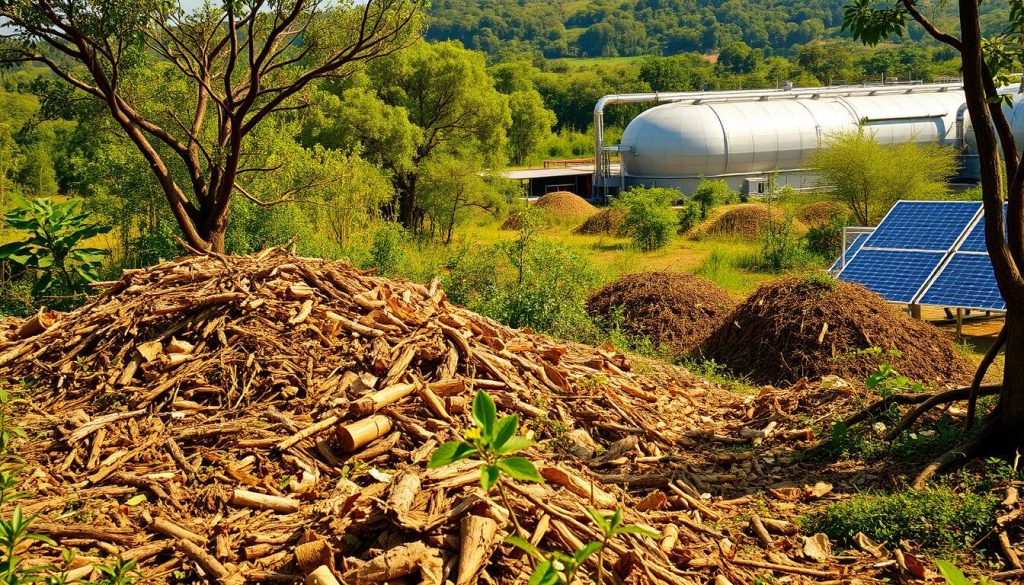
Biomass energy is key in Africa for turning waste into useful energy. It tackles waste problems and uses sustainable resources. Turning farm waste into energy helps farmers earn more and keeps our environment clean.
Agricultural Waste Transformation
New tech is being made to turn farm waste into energy. This means using leftover crops to make renewable biomass. There are a few ways to do this, like:
- Combustion, where organic materials are burned to make heat and power.
- Gasification, turning biomass into gas for fuel.
- Anaerobic digestion, making biogas from organic matter without oxygen.
These methods cut down waste and boost energy security. Farmers who use these methods can be more sustainable and help local energy needs.
Food Waste to Energy Projects
Projects that turn food waste into energy are vital. They solve waste and energy shortages. The process is:
- Collecting food waste from homes and businesses.
- Using anaerobic digesters to break it down.
- Getting biogas for electricity or heat.
These projects reduce landfill waste and offer clean energy. They show how using food waste for energy is good for both cities and countryside.
Geothermal Energy Exploration and Development
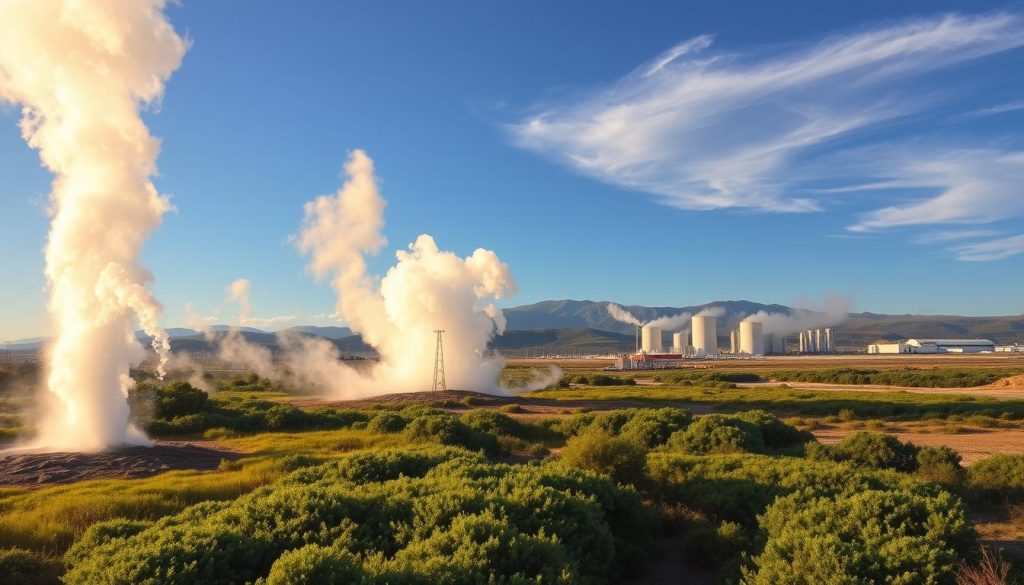
Geothermal energy is a big chance for green power in Africa’s volcanic areas. It can change how we get energy and cut down on fossil fuel use. We’ll look into how geothermal power plants work and their uses, especially for heating.
Geothermal Power Plants
Geothermal power plants use Earth’s heat to make electricity. In places like Kenya and Ethiopia, they’ve been a big win. They use steam or hot water from underground to power turbines.
As tech gets better, these plants make more power. They’re becoming a key part of clean energy.
Direct Use Applications for Heating
Geothermal energy is not just for electricity. It’s also great for heating in towns and countryside. For example, farms use it to warm soil and greenhouses all year.
Also, buildings can use geothermal systems to save energy and money. Here are some cool ways geothermal energy is used for heating:
- It’s used in district heating systems for communities.
- It helps with industrial processes that need a lot of heat.
- It’s used in spas and health centres, thanks to natural hot springs.
The Role of Government Policies in Renewables
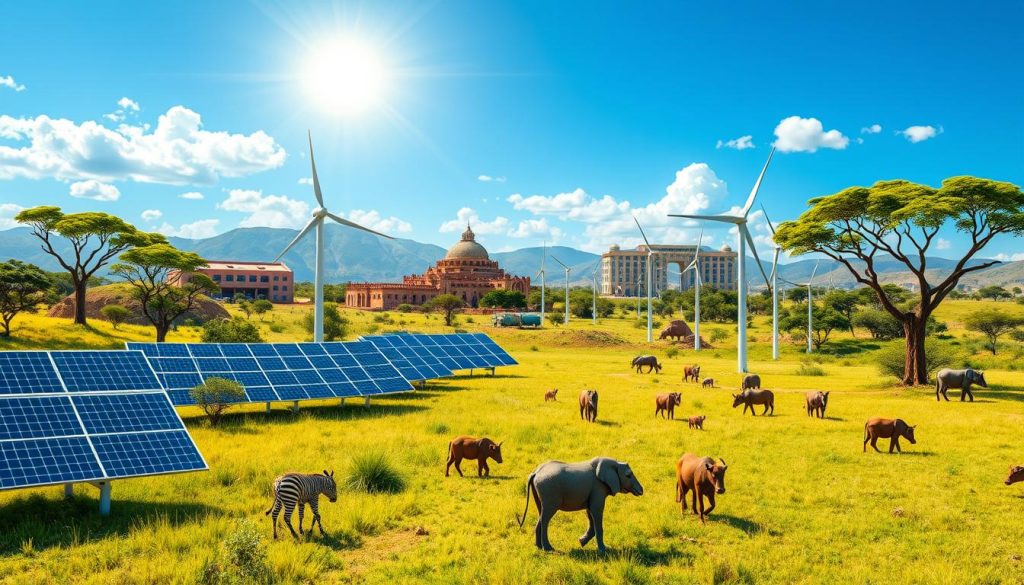
Government policies are key in shaping the renewable energy scene in Africa. They create a stage for innovation with incentives and support. This helps renewable energy startups grow.
Incentives for Renewable Energy Startups
Many countries offer incentives for clean tech investment. These can include:
- Tax breaks for companies in renewable energy projects
- Subsidies to reduce the cost of renewable energy setups
- Grants for research into new solutions
These incentives help create a good environment for startups. They also push for sustainable practices in various sectors.
Regulatory Frameworks Promoting Sustainability
Strong policies rely on solid regulatory frameworks. Clear laws on renewable energy are crucial for startup success. Important parts of these frameworks are:
- Easy processes for permits and licenses
- Clear rules for energy pricing and agreements
- Rules to ensure sustainability
These frameworks build trust and security in the market. This makes it simpler for businesses to succeed. As countries tailor their rules, renewable energy in Africa looks up.
Challenges and Barriers to Renewable Energy in Africa
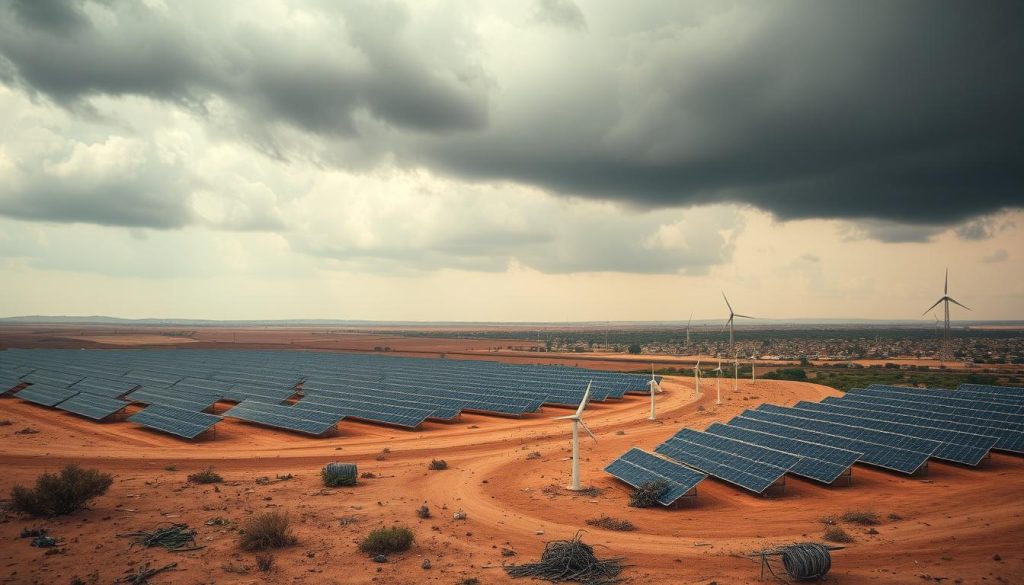
The move to renewable energy in Africa is tough due to many hurdles. Issues like lack of infrastructure and funding hold things back. It’s key to know these problems to help the sector grow.
Infrastructural Limitations
Setting up renewable energy projects is hard because of infrastructure gaps. Many places in Africa don’t have the right transport and grid systems. This makes projects hard to start, leading to delays and higher costs. Key issues include:
- Insufficient energy transmission networks.
- Poor road conditions affecting equipment transportation.
- Limited access to remote areas where renewable resources are most abundant.
Funding and Investment Issues
Finding enough money is a big problem for renewable energy projects. Without steady funding, new ideas struggle to get off the ground. Public and private investments play a big role here. Important points to consider are:
- Increasing access to venture capital for startups.
- Establishing partnerships with financial institutions to optimise funding sources.
- Encouraging government incentives to make investment more attractive.
Successful Case Studies of Renewable Energy Ventures
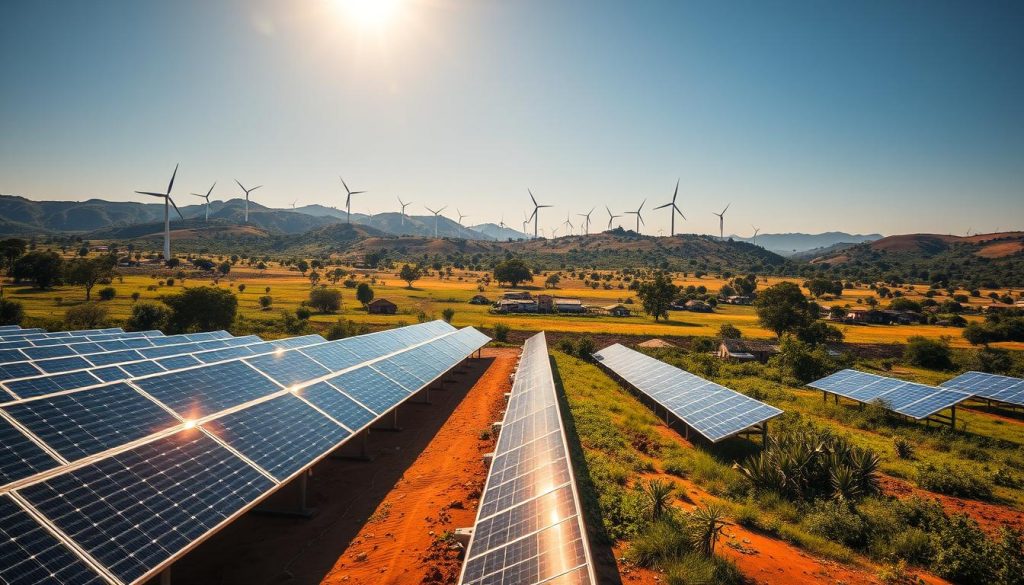
Many case studies show how renewable energy can succeed in cities and local areas. These stories show projects that use green energy, boost the economy, and help people. They are inspiring.
Innovative Projects in Urban Areas
Urban areas are great for renewable energy projects. Cities have shown how new tech can change how we use and make energy. Here are some examples:
- The use of solar panels on tall buildings in London has cut energy costs and pollution.
- Wind turbines on rooftops in cities give clean energy and reduce fossil fuel use.
- Decentralised energy systems in Berlin let local places make and store their own energy. This makes cities more self-sufficient.
Community-led Success Stories
Community-led projects are key in renewable energy. They show how local people can be part of green projects. This brings economic and social gains. Here are some examples:
- A biomass energy project in rural Scotland turns farm waste into energy. It helps local farmers.
- Solar cooperatives in Wales help people buy solar panels together. This makes green energy affordable for all.
- Community wind farms in Ireland give profits to locals and support green living.
Innovative Technologies Supporting Renewable Ventures
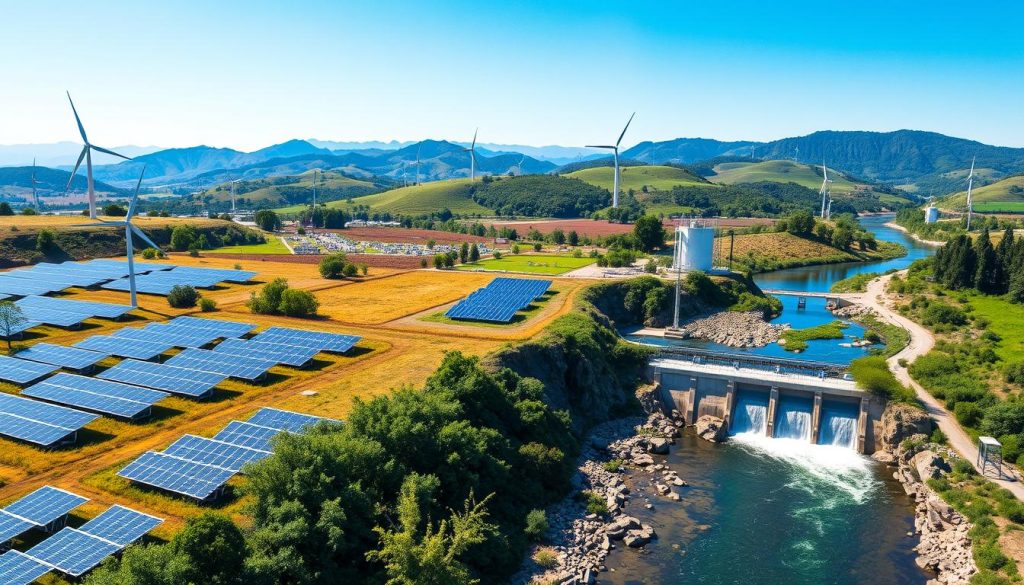
In the world of renewable energy, new technologies are key. They help shape the future of Africa’s energy. Solar technology is getting better, making it more efficient and sustainable.
These improvements, like better solar panels and smart systems, are driving growth. They open up new chances for businesses and communities.
Advancements in Solar Technology
New solar technologies are changing the game. Some of the latest include:
- Higher efficiency solar panels that turn more sunlight into electricity.
- Integrated smart solar systems that make energy use better.
- Floating solar farms that use space more efficiently.
These innovations boost energy production and cut costs. This means more people can use solar energy, everywhere.
Energy Storage Solutions for Renewables
Energy storage is vital for using renewable energy. It makes sure we always have power, even when the sun isn’t shining. Today, we see more:
- Advanced battery technology, like lithium-ion and flow batteries.
- Innovative energy management systems that save energy better.
- Sustainable energy storage that uses extra energy later.
As these technologies get better, they help Africa lead in renewable energy. They ensure we always have power, making Africa a pioneer.
Financing Renewable Energy Projects in Africa
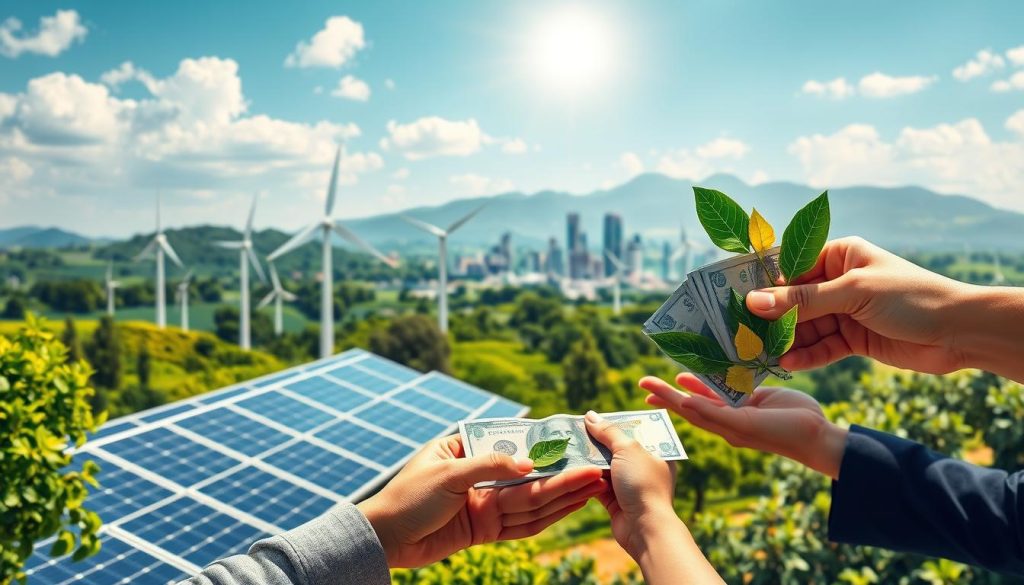
Getting the money needed is key for renewable energy projects in Africa. Startups in this field often struggle to find investors. Knowing how to finance these projects can really help them get the funds they need.
Accessing Venture Capital
Venture capital is crucial for growing renewable energy projects. Here are some tips to attract this investment:
- Have a strong business plan that shows the project’s potential and profit.
- Meet investors who focus on green ventures.
- Join pitch competitions and forums to get noticed.
- Use online platforms to meet investors.
By showing off new ideas and practical solutions, businesses can get the money they need. This lets them start important energy projects.
Microfinancing for Small Enterprises
Microfinancing is a good option for small businesses wanting to go green. There are many microfinancing plans available. They offer loans that are easy to pay back. The benefits include:
- Flexible payment plans that fit small business budgets.
- Money to help local communities use sustainable energy.
- Support and training to manage projects well.
These plans help local businesses grow. They make it easier for renewable energy to spread across Africa.
Future Trends in Africa’s Renewable Energy Landscape
The renewable energy sector in Africa is set for big changes. New technologies and policies will lead the way. Governments and companies are focusing more on clean energy. This is making Africa a key player in the global move to green energy.
Advances in solar and wind power will be key. New energy storage systems will make energy use more efficient and reliable. Off-grid and decentralised energy solutions will also grow, helping more people get access to energy.
More money from abroad will go into renewable projects. This will push for better policies to support clean energy. Local energy solutions will be linked to national grids, making energy more stable and sustainable. These changes point to a bright future for renewable energy in Africa.

